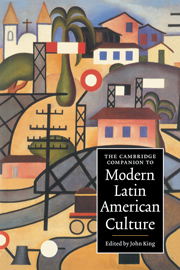Book contents
- Frontmatter
- Introduction
- 1 Pre-Columbian and colonial Latin America
- 2 Latin America since independence
- 3 Spanish American narrative, 1810-1920
- 4 Spanish American narrative, 1920-1970
- 5 Spanish American narrative since 1970
- 6 Brazilian narrative
- 7 Latin American poetry
- 8 Popular culture in Latin America
- 9 Art and architecture in Latin America
- 10 Tradition and transformation in Latin American music
- 11 The theatre space in Latin America
- 12 Cinema in Latin America
- 13 Hispanic USA
- Index
3 - Spanish American narrative, 1810-1920
Published online by Cambridge University Press: 28 May 2006
- Frontmatter
- Introduction
- 1 Pre-Columbian and colonial Latin America
- 2 Latin America since independence
- 3 Spanish American narrative, 1810-1920
- 4 Spanish American narrative, 1920-1970
- 5 Spanish American narrative since 1970
- 6 Brazilian narrative
- 7 Latin American poetry
- 8 Popular culture in Latin America
- 9 Art and architecture in Latin America
- 10 Tradition and transformation in Latin American music
- 11 The theatre space in Latin America
- 12 Cinema in Latin America
- 13 Hispanic USA
- Index
Summary
In an essay written in 1928, the Peruvian radical intellectual José Carlos Maríategui reflected on literary nationalism:
The flourishing of national literatures coincides, in Western history, with the political affirmation of the national idea . . . with the liberal revolution and capitalist order . . . 'Nationalism' in literary historiography is thus a phenomenon of the purest political extraction, foreign to the aesthetic concept of art . . . The nation itself is an abstraction, an allegory, a myth, that does not correspond to a constant and precise, scientifically determinable, reality.
In recent decades the concept of the nation has been under scrutiny in ways similar to Mariátegui’s critique. But in Spanish America, the creation of nations is inextricably intertwined with literarydevelopment, and no single historical narrative can account for the multiple developments in the literary sphere. National political projects shaped historiography as well as the history and concept of literature because, despite similarities of language and formation within the Spanish heritage, vast geographic extensions and striking cultural differences made Spanish America difficult to conceive without national categories. The dominance of the national framework did not, however, preclude other visions of the future. From the early years of the nineteenth century, independence leaders like Francisco de Miranda and Simón Bolívar envisioned a unified Spanish America joined together by a common linguistic and occidental cultural heritage.
- Type
- Chapter
- Information
- The Cambridge Companion to Modern Latin American Culture , pp. 60 - 83Publisher: Cambridge University PressPrint publication year: 2004



